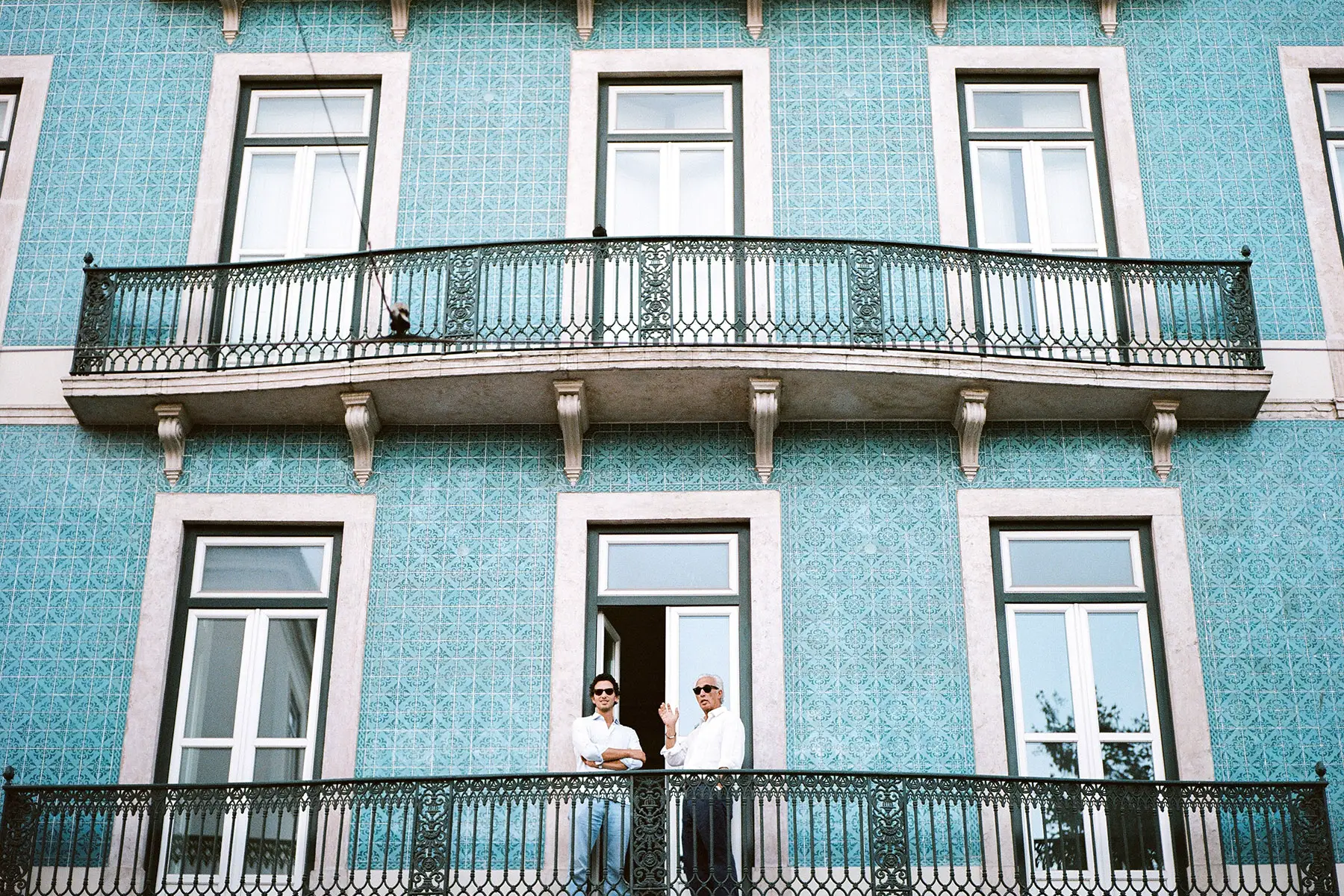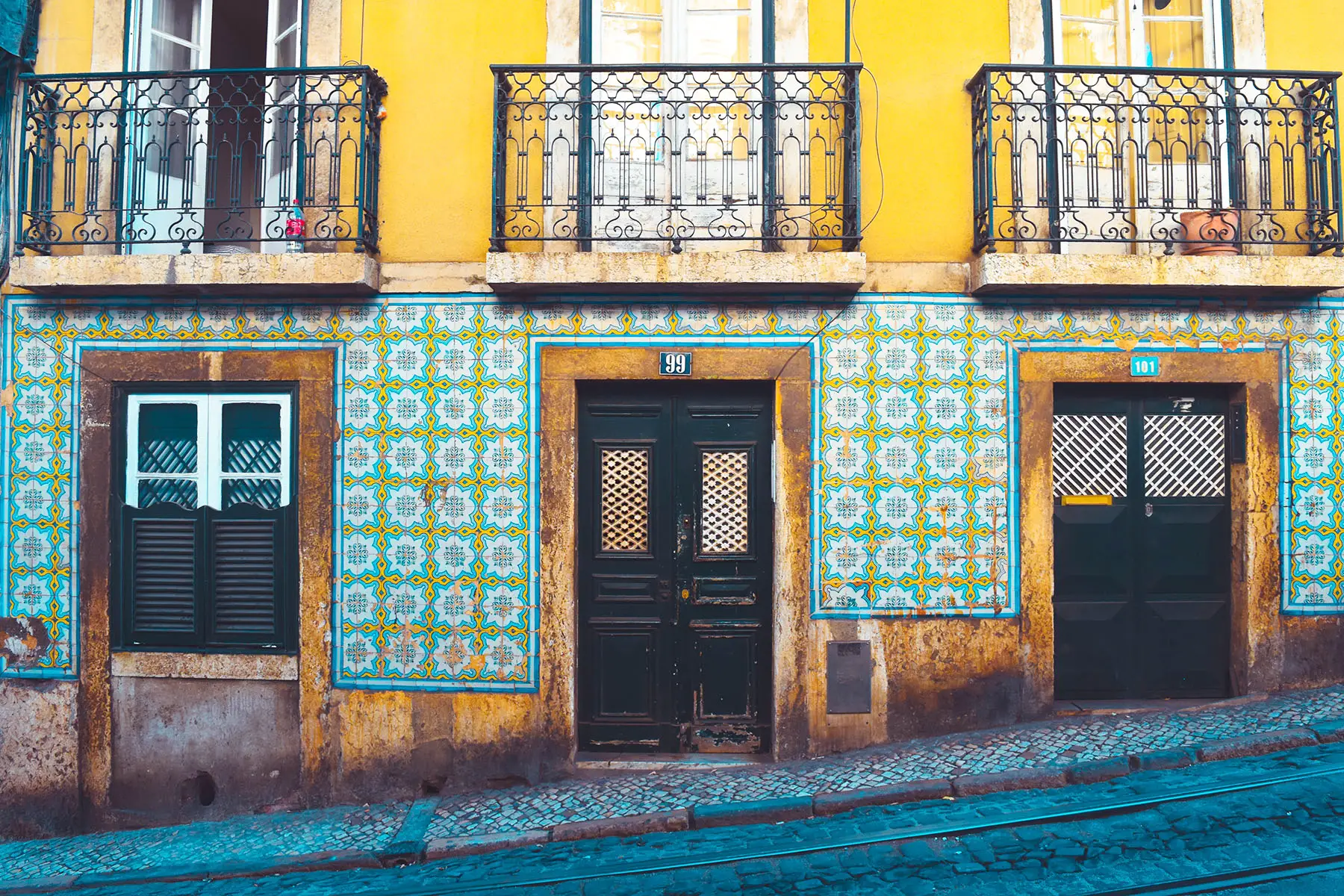Buying a house can be daunting, especially if this is your first time dipping your toes in the real estate pool. Add a new country to the mix, and you might want to dip out all together.
Luckily, this article is here to help. From housing listings and property prices to building documents and making an offer, here’s what you need to know about buying real estate in Portugal.
Continue reading for information on the following:
- Homeownership in Portugal
- Can a foreigner buy property in Portugal?
- The Portuguese real estate market and property prices
- What other costs are involved in buying a house?
- How to finance a property purchase in Portugal
- How to find a house in Portugal
- What is the process of buying real estate in Portugal?
- How to sell a property in Portugal
- Expat tips on buying a house
- Useful resources
Pearls of Portugal
Pearls of Portugal are a buyer’s agent and immigration services provider who can assist you in your move to Portugal. If you’re keen to buy property in Portugal, they’ll guide you through the process. They also advise on visa and tax concerns. Contact Pearls of Portugal to find out how they could assist you.
Homeownership in Portugal
Portugal has a relatively high homeownership rate. Nearly 77.8% of residents own their own homes, compared to the European Union (EU) average of 69.1% (Eurostat, 2023). This figure has remained relatively steady for the last couple of years, ranging between 77.3% and 78.3%.
According to Statistics Portugal (Instituto Nacional de Estatística – INE), homeownership is mainly reserved for older generations (2021). Indeed, it is not uncommon for Portuguese to live with their family well into their 30s. In 2023, roughly 68.3% of adults aged 18 to 34 shared a household with their parents.

At the same time, the country has become increasingly popular for foreign property investment, especially due to government incentives like the Golden Visa and the Non-Habitual Resident (NHR) tax system. Indeed, INE reports that more than 1 million of the nearly 6 million houses in Portugal are second homes or destined for seasonal use.
Can a foreigner buy property in Portugal?
Expats typically rent a home during their first few years in the country and purchase a home when they are more familiar with the area and real estate market.
Luckily, Portugal does not pose any restrictions when it comes to internationals buying real estate. Of course, you will need to have the right visa; EU citizens need to register with the authorities, and non-EU citizens must apply for a long-term visa. All residents, foreign or otherwise, must also have a tax number (Número de Identificação Fiscal – NIF) to get on the real estate market.
But that is it. Expats have the right to buy and access mortgages or credit in Portugal. Keep in mind, however, that Portuguese citizens can usually get a better home loan. While they can generally borrow up to 90% of the property value, this percentage can drop to only 70% for non-EU residents.
The Portuguese real estate market and property prices
Compared to other EU member states, real estate prices in Portugal remain relatively affordable, costing 20% below the EU average (2022). That said, the country is facing a growing housing crisis that’s driven by a number of factors.
For example, the country has plenty of empty properties that are either abandoned, remain stuck in inheritances, or are used for short-term vacation rentals.

At the same time, property prices have seen a notable upswing in the last decade. From 2017 to 2022, they rose about 9.2% a year. Between 2020 and 2021, however, house prices in Portugal shot up by an incredible 157%. This surge was partly caused by foreign investment, with expats spending more than twice the amount of money than Portuguese nationals (INE, 2021).
Meanwhile, the average mortgage interest rate in Portugal nearly doubled from 2022 to 2023, making it difficult for families to afford their monthly installments.
The housing crisis has led to several protests and government measures to correct the market. For example, the Golden Visa program now no longer includes property purchases as eligible investments. Low-income families can also apply for government assistance in the form of an interest rate subsidy for their mortgage loans.
How much does a house cost in Lisbon?
Lisbon (Lisboa) is one of the most popular and expensive places to live in Portugal. As of June 2024, you can expect to pay €4,096 per square meter, compared to a national average of €2,950.
Some of the best neighborhoods to live in the capital include Príncipe Real, Campo de Ourique, and Lapa. The city mainly offers a mix of older and modern apartments. That said, it’s possible to find houses too, especially on the outskirts.
How much does a house cost in the Algarve?
If you dream of living by the coast, the Algarve might be the place for you. This southern region is especially trendy among expats. In fact, in 2022, more than 25% of foreign residents bought a property there.

Housing prices in the Algarve are in line with Lisbon, with the average square meter costing around €3,373. The real estate market includes modern houses and luxury apartment complexes, especially in large resort areas like Portimão and Albufeira, which are the most expensive.
What other costs are involved in buying a house?
Housing prices aside, there are a number of other costs to cover when buying real estate in Portugal. Overall, you should budget at least 10% on top of the property value.
Additional costs may include:
| Estimated costs | Note | |
| Estate agent fees | Between 5–10% of the final sale | These are usually included in the property price, unless stated otherwise |
| Bank and mortgage fees | Around €1,000 | |
| Condominium or apartment fees | Varies per location and complex | These only apply when buying an apartment |
| Home insurance fees | Between €80–400 a year | Insurance is mandatory when you have a mortgage |
| Municipal tax (Imposto Municipal sobre Imóveis – IMI) | 0.3% to 0.8% of the declared property value. You can use this online calculator to see how much you can expect to pay. | First-time homeowners may apply for a three-year exemption. In most cases, this exemption is automatically granted when you change your fiscal address. |
| Property transfer tax (Imposto Municipal sobre as Transmissões Onerosas de Imóveis – IMTOI) | This one-time tax is based on several factors, like the declared value of the property (valor tributável do imóvel) and the location | Exemptions are available if you are purchasing a permanent home and the declared value is under the limits set by the state. You can use this online calculator to determine the IMT. |
| Registration fees | Between €280–700, depending on the location | Fees are usually higher when you have a mortgage |
| Stamp duty (Imposto de selo) | 0.8% of the declared property value | When you apply for a home loan, you’ll need to pay an additional 0.6% of your mortgage |
Beyond these transaction fees, you’ll need to consider other optional costs. For example, you may want to hire a surveyor to inspect the property for any issues. Some banks will cover this for you, but in most cases, you’ll need to pay for this yourself.

Similarly, you may choose to hire expert advice to oversee any legal or immigration processes. They can help you find a lender for the best deal on a Portuguese mortgage. The top expat services in Portuguese real estate include:
When it comes to paying fees, Wise has a specialist team to help move large transfers abroad and can save you money on currency exchanges.
Wise
Buying a property abroad is a big step and involves important financial decisions. Wise, an international money transfer company, provides specialist support to help you navigate large international transfers and save on exchange fees. Fill out Wise’s online form today to find out how they can assist you.
How to finance a property purchase in Portugal
If your money goose hasn’t laid her golden eggs yet, you can always apply for a home loan. Portugal has three types of mortgages:
- Variable-rate (taxa de juro variável) – linked to the Euribor rates
- Fixed-rate (taxa de juro fixa) – fixed throughout the mortgage duration
- Mixed rate (taxa de juro mista) – fixed rate initially and later adjusted according to Euribor
You can secure a mortgage directly from a local bank or hire your own mortgage broker. The last option may be helpful if you want to compare loan options across different banks. Alternatively, you can consult an online mortgage calculator or a comparison site like Deco ProTeste.
In Portugal, banks usually lend a maximum of 90% of the real estate value to Portuguese citizens and about 70% to expats and freelancers. It’s worth noting that you must prove that your monthly payments won’t take more than 35% of your income. If it is 50% or more, the bank will most likely refuse it.
How to find a house in Portugal
The easiest way to find a home in Portugal is to contact an experienced real estate agency (agência imobiliária). These can cover the entire country or specific towns and regions. Some specialize in helping expats and provide agents who speak multiple languages.
All estate agents need to be registered with the government and display a license number. Available properties can be found on the real estate websites or property portals, such as:
When looking for a residential home, be sure to check it has a habitation license (licença de habitação). This is mandatory for you to live there.
Already-built homes
There are plenty of houses on the market in Portuhal. When you’ve found one you like, you can schedule an in-person visit in person. In most cases, you will tour the property on your own. However, some agencies will schedule an appointment with multiple viewers, especially if it’s a property auction.

If you’re based outside Portugal, you may also be able to view the property online. Nonetheless, it is always recommended to see the home in person before you put in an offer, as you can’t always spot every crack and issue on camera.
Some tips:
- Make a list of your preferences beforehand so you can keep them in mind when viewing the property
- Check the home for its gas supply (natural versus bottles) and access to water and electricity
- When buying real estate in Portugal, keep in mind that many houses are prone to humidity. This can affect the area you choose to live in.
- Hiring a local real estate agent can save you time searching and filing out paperwork. They’re also familiar with the area, so they can help you choose the best neighborhood for you.
Construction projects
While (old) already-built houses have their charm, they also come with some challenges. For example, they’re not fully equipped with modern sustainability technologies, and other people have already lived (and died) there.
New construction projects, on the other hand, allow you to customize the house to your liking. If this has your preference, it’s important to check the developer’s reputation and ensure they’re complying with the legal requirements.
When buying development property in portugal, be careful issuing payments, and make sure you have a contract in place with stated deadlines. Additionally, you should check in with the development project every once in a while to ensure things are going as planned.
Designing your own home
Creative visionaries can also choose to design their own home on a plot (terreno or lote) that has been approved for housing.
You can find pieces of land for sale at most property portals and real estate websites. Before putting in an offer, make sure to check its usage license (licença de utilização) at the local town hall. While the cost will depend on the location and property size, you can expect to pay anywhere between €40,000 and €200,000.

After that, you can hire a local architect or a builder to bring your project to life. You should obtain quotes from several professionals, ensure they are fully insured, and check examples of their previous work. Keep in mind the lowest offer might not give you the best value for money in the long run.
Once that’s sorted, you can apply for a building permit (licença de construção) at the nearest council. A project’s approval usually takes about 30 days, but it can take much longer.
While you can do the construction on your own, it’s best to have a supervisor to oversee the project. Before you can officially move in, you will need to go back to the city council and apply for a housing permit (licença de habitação).
What is the process of buying real estate in Portugal?
Buying a house in Portugal is a relatively simple and quick process. However, it can take a while to find the right home and get a mortgage approval. Below is a step-by-step list of what you can expect.
While it can take a while to find the right home and get a mortgage approval, the buying process itself is relatively quick and simple. Below is a step-by-step list of what you can expect.
Step one: finding out your mortgage options
If you need a mortgage, you should start looking for options as soon as possible. This will give you an estimate of how much you can borrow and the likelihood of being approved. Try contacting a few local banks to see what you’re working with.

Step two: choosing a home and making an offer
When you’ve found your new dream home, it’s recommended to hire a surveyor before making an official offer. They’ll check the property for any major problems and can help prevent future mishaps. If there are blaring issues but you still want to put in an offer, you’ll also have grounds to renegotiate the price.
When ready, you can make an offer. In Portugal, it’s relatively common to ask for about 10-15% below the asking price. Negotiations can happen over the phone, via email, or in person. Keep in mind that when there are several offers on the table, the highest bid usually wins.
Step three: paperwork and payments
When you and the seller agree on a price, you’ll need to:
- Sign a purchase proposal contract (contrato-promessa compra e venda) – this will be provided by the estate agent. You can find a template version here. After that, if either party breaches the agreement, they must pay a compensation fee.
- Pay the deposit – the deposit is usually around 10% of the property value. If you decide to pull out of the purchase, you will lose the deposit. But, if it’s the buyer who refuses to sell, they must pay you back twice the deposit.
- Sign the property deed – as the buyer, you can decide where to formalize the deed. Most estate agents will organize this for you, but if you’re doing it on your own, there are several places you can go to. This includes services like Casa Pronta, notaries, solicitors, and lawyers. If you don’t speak Portuguese, you will need to hire a translator.
- Pay the rest of the costs – when you’ve transferred the remaining purchase price, the property transfer tax, and the stamp duty, you will receive the keys to the property
- Change your fiscal address – once the sale is complete, you have 15 days to update your tax address. Portuguese citizens may do this online; expat residents must head to their local tax authority office.
Step four: arranging insurance and utilities
In Portugal, it’s mandatory to take out home insurance when you have a mortgage. Ideally, you arrange this as soon as the property is in your name.

Your policy must cover fire damage, which is usually included in the general multi-risk home insurance (seguro multirriscos). The bank will likely also demand you take out life insurance (seguro de vida). Most banks can offer you an insurance package, but you’re more than welcome to compare offers with other providers.
If you’re buying real estate in Portugal using your own capital, home insurance is not mandatory, but it’s highly recommended. Additionally, you may choose to cover your belongings in case of theft or damage.
Once that’s sorted, you’ll need to take care of the utilities, starting with your water supply. Water is administered at a local level, and you cannot choose your provider. You’ll need to ask your municipality which water supplier operates in your area.
For electricity, gas, and internet, there is a range of suppliers, which means you can compare offers based on what suits you. Find more information in our article on utilities in Portugal.
How to sell a property in Portugal
When you decide to move homes, you can put up your house for sale. The first step is to get a property valuation. You can do this by researching properties with similar traits in your area or, better yet, requesting an estimate from a real estate agency.

Additionally, you will need to compile a sales file with documents such as:
- Energy certificate (certificado energético)
- Permanent certificate of land registry (certidão permanente do registo predial)
- Property plan
- Other required documents
Next, you’ll need to decide how to sell your property. You can do it yourself (i.e., private sell) or through a real estate agent. The latter option comes with fees but can save you a lot of time with bureaucracy and property tours.
The next steps are those listed above (buying process), but in reverse.
When selling real estate, keep in mind you have to pay capital gains tax (mais-valias de imóveis). In Portugal, this usually accounts for 50% of your profit. However, you can deduct the costs of any renovations you’ve done to the property in the five years before you sell it.
For a quick cost estimate, you can use this online calculator.
Expat tips on buying a house
There are a few things that expats buying real estate in Portugal should factor in. To make the process go smoothly, you should:
- Assess what part of Portugal you would like to settle in. If possible, visit several regions and try renting for a few months to ensure you like the area.
- Research the local market by looking at house prices and the types of properties available
- If you are planning to buy a property that needs renovation, be aware of the local construction regulations and learn about the assistance schemes for green renovations
- Considering doing a second property visit with a surveyor. Visiting properties at different times of the day can also help you get a better idea of the area.
- Make sure to factor in the extra costs of buying real estate in Portugal into your budget
Useful resources
- eGov – a government platform listing the several steps on how to buy and sell a house in Portugal
- Idealista – a price report of properties for sale in Portugal
- Portal da Habitação – provides financial aid and support for housing in Portugal










